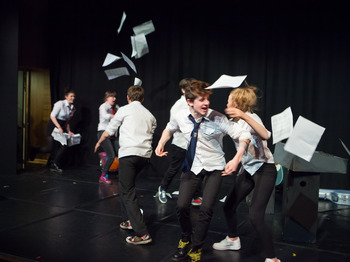@ Scottish Storytelling Centre, Edinburgh, until Sat 13 Jun 2015
Despite austerity cuts, and a financially ominous outlook for the future of the arts, Strangetown Youth Theatre continue to put together an auspicious foundation for fledging young actors of various age ranges; offering them the opportunity to work with experienced, aesthetically driven practitioners, on productions of a consistently high quality.
In Alan Gordon’s witty, earnest, and touching one-act play Viral – effortlessly directed by Amy Watt, using minimal props and set – the audience are at once immersed into the capricious world of everyday 21st century teenage life, where social media, planting the ‘seed of life’, and peer popularity are at the forefront of the narrative, cast members weaving in and out of scenes with confidence, throwing one-liners across the stage with alacrity, and treating the spectator to the gracelessness of young love’s implacable pang.
A much maligned re-tweeted tweet about a girls sexual proclivity, a confused class-mate threatening suicide, and a surreptitiously filmed drunken slur gone viral, the many vicissitudes of high-school life are tautly packed into this refreshing, but eye-opening hour of theatre, where the dangers of social media are firmly brought to the surface, bearing the question: does no-one keep their journal entries hidden from the world anymore ?
At first, social media sites were introduced to encourage prolonged contact with people outwith our everyday social circle, the proverbial world wide web pen-pal, and an opportunity to share moments of nostalgia and picturesque induced reminiscence. However, what has began to materialise is something a bit more barbaric, despotic and cruel, with people lacking in any sort of discerning behaviour, posting racist, disparaging and sexually provocative comments. The fun element in these sites is wavering, leading to occasionally high-risk and dangerous situations, because people have forgotten about normal decorum: thinking they can use the internet as a metaphorical fortification, abusing people’s privacy and disregarding the possible provocation even the slightest fabrication can manifest.
The really pleasing thing about this production is the enthusiasm of the youngsters, the numerous participants willing to spend less time on their computers, and more time forming tangible instead of virtual relationships.
Putting to one side the glaringly obvious diction, articulation, and intonation problems, and accepting that an ensemble of around twenty teenagers will inevitably consist of varying theatrical abilities, this production – sparkling with a mixture of pathos and humour – was one Friday night ‘facebook status’ that deserves to go viral.
